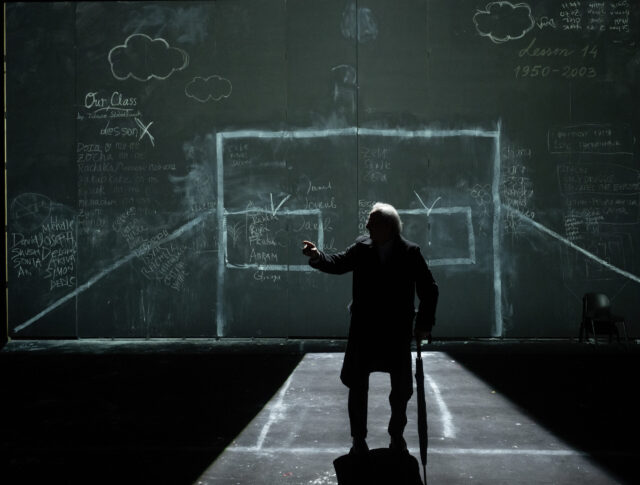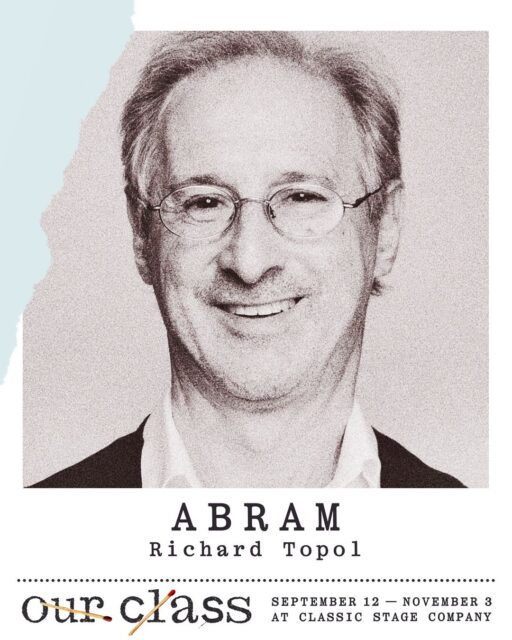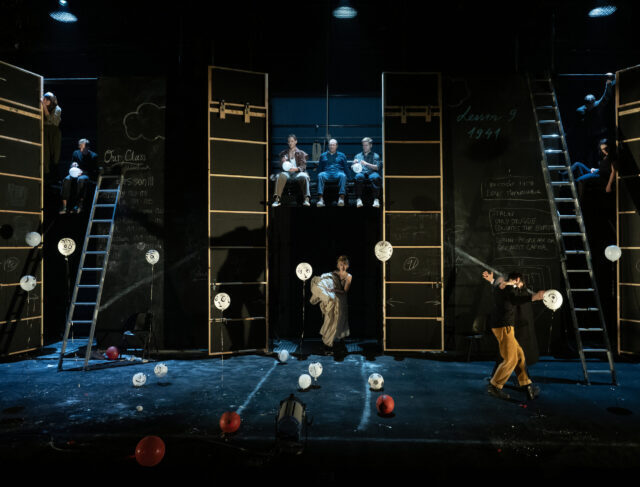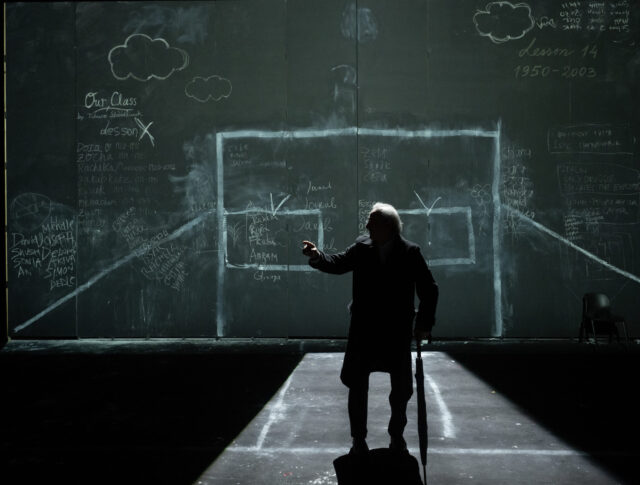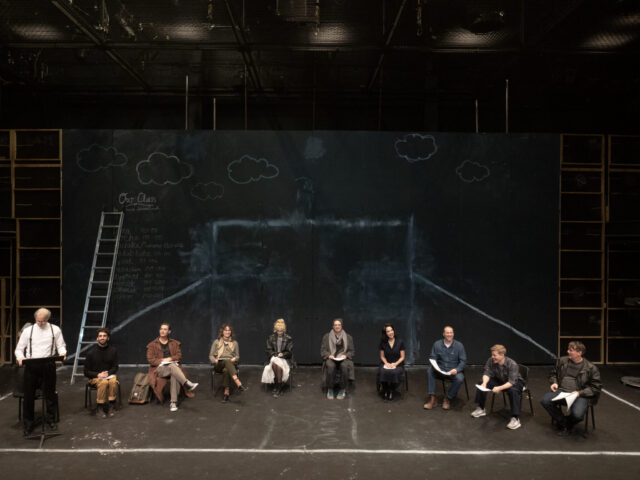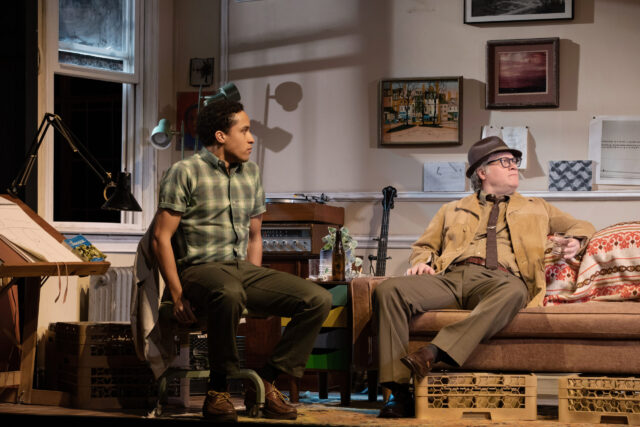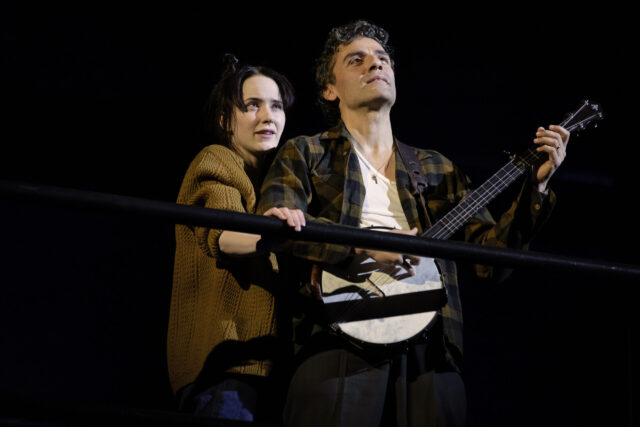
The cast of Arlekin’s Merchant of Venice playfully poses at press rehearsal (photo by twi-ny/mdr)
ARLEKIN IN RESIDENCE: THE MERCHANT OF VENICE
Classic Stage Company, Lynn F. Angelson Theater
136 East Thirteenth St. between Third & Fourth Aves.
Tuesday – Sunday, November 22 – December 22, $59-$129
www.classicstage.org/venice
www.arlekinplayers.com
Introducing a press rehearsal of two scenes from Igor Golyak and Arlekin Players Theatre’s adaptation of The Merchant of Venice at Classic Stage, producer Sara Stackhouse said, “Igor directed a very early iteration of this — this is quite different — but it was the DNA of this version of The Merchant of Venice. It was hilarious, and devastating, in Boston. It was like a punch in the face to antisemitism, and there were a lot of folks at that time who said to us, ‘Why are you doing a play on antisemitism? Why are you doing a Jewish play?’ One of the things that I have found working with incredible artists, Igor being one of them, is the way they feel the undercurrent of what is happening in the world all the time, and often ahead of time, and begin to bring it to the surface in artistic projects. That has been true for all the project I’ve done with Igor and through Arlekin. Unfortunately, it has come further and further and further to the surface not only in the art we’re making but also in the world. So we’re now doing this version of The Merchant of Venice in the context of October 7 and what happened in Amsterdam and the election and a real rise in hatred and antisemitism in the world. That canary in the coal mine — there’s no mine now; it’s like a canary flying out around the world. But one of the ways that actual humans respond to tragedy is they don’t sit and cry; they try to laugh; they try to survive. So this play is a comedy, and it’s a blast until it’s devastating.”
Boston-based Arlekin continues its residency at Classic Stage with The Merchant of Venice, following its highly acclaimed staging of Polish playwright Tadeusz Słobodzianek’s 2008 drama, Our Class, which was inspired by a horrific 1941 pogrom that occurred in the small village of Jedwabne in Poland. Running November 22 to December 22, the uniquely unpredictable work is built around a cable access program that is putting on the play, complete with low-budget foibles, casting controversies, and technical glitches. T. R. Knight stars as the host of The Antonio Show, with Richard Topol as Shylock, Alexandra Silber as Portia, Gus Birney as Jessica, Tess Goldwyn as Nerisa, José Espinosa as Bassanio, Stephen Ochsner as Launcelot Gobbo, and Noah Pacht as Lorenzo. At one point, Shylock puts on a Dracula costume, a funny yet incisive way to demonize the character who famously declares, “If you prick us, do we not bleed?”
“The first Quarto published in 1600 titled this play The most excellent historie of the merchant of Venice with the extreame crueltie of Shylocke the Jewe towards the sayd merchant, in cutting a just pound of his flesh: and the obtayning of Portia by the choyse of three chests. That’s a mouthful,” Golyak, who was born in Kyiv and came to America as a Jewish refugee when he was eleven, said in a statement. “It casts Shylock as a cruel villain and sets the expectation of a love story, a comedy, and a ruinous tragedy all wrapped into one. We are true to this in our production and we deliver all of it — an undercurrent of bias, a comedy, romance, action, and escapades — a real romp of a performance. But antisemitism is a light sleeper, and as the story plays out, it inevitably awakens and the result is devastating. It mirrors who we are, the times we live in, and how quickly the tides can turn.”

Rich Topol stars as Shylock and José Espinosa is Bassanio in Arlekin’s Merchant at Classic Stage (photo by twi-ny/mdr)
Golyak and Arlekin have previously presented such innovative virtual successes as Witness, State vs. Natasha Banina, and chekhovOS /an experimental game/ in addition to the hybrid The Orchard with Jessica Hecht and Mikhail Baryshnikov.
“The more antisemitism rises in the world, the more people are hating on the Jews, the more Jewish I feel,” Golyak, whose great-grandparents were killed at Babi Yar, recently wrote. “But the play, and Jewish life, and this world are devastating. I’m shattered like glass. In sooth, as an artist, as a parent, as a Jew, and as a human, I guess I do know why I am so sad.”
“It’s a wild ride,” Golyak also noted about the play.
Judging from what I saw at the rehearsal — you can get a sneak peek here — it’s a wild ride we all need to take.
[Mark Rifkin is a Brooklyn-born, Manhattan-based writer and editor; you can follow him on Substack here.]
